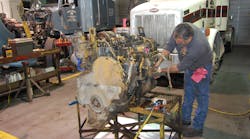“I could employ 500 more technicians if they were available,” Mike Besson (at right), vp of dealership operations & customer care for Rush Truck Centers (RTC), told FleetOwner here at the company’s 9th annual Technician Skills Rodeo.
“When it comes to recruiting and retaining technicians, we have to take a multi-pronged approach,” he explained. “This event is one part of it, but we also need to think about helping them [technicians] develop a long-term career path in this industry by giving them the right tools and the right training.”
RTC, the truck dealership arm of $3.4-billion conglomerate Rush Enterprises, currently operates 110 locations and 28 collision centers, employing some 2,199 technicians; including those staffing a fleet of over 300 mobile service trucks.
Besson noted in a previous interview that RTC spends millions on training as part of its recruiting and retention efforts, as such training helps the company capture more customer business while helping technicians make more money.
According to the most recent Department of Labor data, there are some 238,150 currently employed in the U.S. as bus and truck mechanics and diesel engine specialists, earning a median salary of $44,120 or $21.20 per hour.
Yet Fred Scott, service manager for the RTC facility outside San Antonio, TX, stressed to FleetOwner that technicians can make a lot more than that especially in high-demand sectors such as oilfield service because the costs of vehicle downtime are much higher today than in the past.
And that is where the training comes into play, he pointed out.“Our philosophy is, why limit the focus on our technicians capabilities to just one component or area of the truck,” Scott (at right) said. “When vehicles or other equipment go down, a customer needs it up and running as fast as possible. That’s why we’re seeing more demand for things like mobile maintenance service but it’s also why I push training constantly with our people. That helps them help the customer better.”
For example, while emission control systems for diesel engines demanded most of the technician’s focus in recent years, now demand to handle chassis-related issues is growing quickly – particularly as the tougher inspection criteria encompassed within the new Comprehensive Safety Accountability (CSA) program introduced by the Federal Motor Carrier Safety Administration (FMCSA) four years ago can place trucks out of service for even minor issues.
That’s also one of the factors not only forcing a change to the skill sets of technicians but how they are managed as well, noted Andrew “A.J.” White, mobile service manager for RTC’s San Antonio dealership.
He likens that management process to being an “offensive coordinator” for an NFL football team, understanding the strengths and weaknesses of each “player” and thus developing a game plan to maximize the former while minimizing the latter.
“The technician is the one in front of the customer every day and that relationship is a key part of the business now,” White told FleetOwner.
Some technicians are like quarterbacks, he explained, able to run an audible based on what the customer brings to them, while others need “set plays” in handling such interactions.
The critical part, though, White stressed, is to make a technician a “go-to” contact for the customer, someone who will be multi-talented enough to handle a variety of vehicle issues in order to keep the customer’s equipment up and running.
“That’s where loyalty comes into play,” added Scott. “Not just customer loyalty but technician loyalty to the dealership. That business coming in makes them money and provides paths for them to advance in their careers. And that makes them want to stay and work for you, not go somewhere else.”





